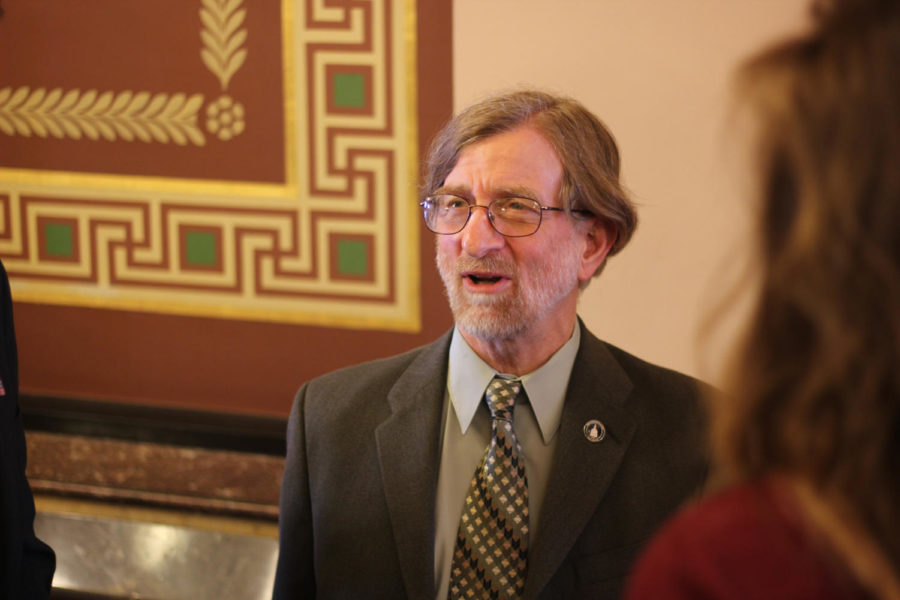Herman Quirmbach shoots for third consecutive tuition freeze
Photo: Kait McKinney/Iowa State
Senator Herman Quirmbach speaks with members of the Government of the Student Body and ISU Ambassadors at the Capitol Building on Regents’ Day Thursday, March 29.
August 27, 2014
It’s possible that ISU juniors that are from Iowa could end up paying the same tuition rate all four years of college — if everything falls into place for a third tuition freeze.
Sen. Herman Quirmbach, D-Ames, is hopeful about the state legislature proposing to the Board of Regents a third tuition freeze for the 2015-16 school year for in-state students.
“The Board of Regents made us an offer we couldn’t refuse last year, and we hope to make them an offer they can’t refuse this year,” Quirmbach said.
The third tuition freeze was a topic discussed at the Senate democratic caucus earlier this month. Quirmbach said the Senate democrats seemed supportive of another tuition freeze.
Quirmbach hopes to promote this proposal as the chairman of the education committee in the state Senate. As a member of the education appropriations subcommittee, he is also involved in budgeting for items such as the tuition freeze.
“The tuition freeze is something that I think is really important that sometimes as students we overlook,” said Hillary Kletscher, Government of the Student Body president.
If approved, it would be the first time since 1975 that in-state undergraduate tuition has remained the same for four years in a row.
Quirmbach encourages students to contact their hometown legislators to support the proposal.
“That kind of outreach was helpful in moving the proposal forward last year,” Quirmbach said.
Kletscher said that it’s important as students to lobby the state legislature and share why it’s important to fund higher education and support students from Iowa who want to pursue it.
“Tuition freeze is a popular item,” Quirmbach said. ”I have talked to a lot of parents with kids in school and parents with kids even in high school.”
Quirmbach said the main motivating factor for the freeze is keeping higher education as affordable as possible.
After graduation, college students in Iowa have an average debt of about $29,400, according to the Institute for College Access and Success.
Last year, the Board of Regents proposed an increase of 4 percent in higher education appropriations from the state legislature in order to freeze tuition costs for in-state students.
In order to make it happen for the next school year, the state legislature and governor must agree to a proposal for the Board of Regents that will fit into the state’s budget as well as meet the board’s needs.
Last year, the 4 percent increase in higher education appropriations equaled about $24 million, with $7 million going to Iowa State. Quirmbach estimates the proposal to the board this year will be about the same.
“It covered inflationary costs and it also helped with basic needs such as compensating faculty properly and keeping up with the market to have competitive faculty,” Kletscher said.
Kletscher said that accessibility to an affordable education is important in allowing students who are from Iowa to remain in-state to get a higher education without it being cost prohibitive.
“ISU is known as a university that cares about being affordable for students and helping students stay in state for college,” Kletscher said. “That reputation, affordability and accessibility will build credibility for the university.”
The freeze allows for a more diverse student population within the state of Iowa, with students from a variety of socio-economic environments.
Even though out-of-state students have climbing tuition rates, Kletscher said that having attended Iowa State will translate to a well-rounded experience. Employers will be able to see that out-of-state students attended a university that valued people from every background and made accessibility and affordability a priority.







